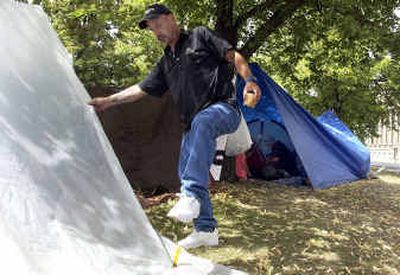Transients hope to wait out mayor

Mayor Jim West said he is looking at the ordinance against transient shelters, which was approved by the City Council on June 28, and will decide whether to sign it by Monday.
Meanwhile, opponents of the ordinance continue to camp on the Riverside parkway between Monroe and Madison streets in downtown Spokane as they have since June 29. The protest organizer said the mayor told him that the protesters had better be out of the way when city crews come to mow the narrow strip of grass within the next couple of days.
In a later interview, West wouldn’t speculate on what action he might take if the protesters don’t leave.
“If we’re in the way, we will most likely be ticketed,” Dave Bilsland, chairman of People 4 People, a homeless advocacy group, said West told him at a private meeting at City Hall on Tuesday afternoon.
The mayor said there is currently space available in shelters, “but a lot of the folks don’t want to take advantage of it because of the restrictions placed on them.”
He promised to meet with the protesters again to try to work something out.
“I probably will sign (the ordinance),” West later told The Spokesman-Review after meeting with Bilsland. “I have to look at it and decide.”
West said the city is currently engaged in discussions with the U.S. Department of Housing and Urban Development in looking at ways to end the problem of homelessness
“It’s not like we are standing still,” West said.
Meanwhile, Bilsland said he and the squatters have no intention of moving until the city finds them someplace to move to.
The group of protesters, which now has grown to about 50 people camped out in tents and makeshift shelters, has collected more than 1,500 signatures against the ordinance approved by the City Council on June 28.
“We the undersigned members of the human race respectfully request that the Spokane City Council move to rescind the transient shelter ordinance,” the petition reads.
West had 10 days from the time the ordinance was approved on a 4-3 vote of the council to sign it or veto it.
If he signs it, it will become law in 30 days.
“If he vetoes it, we’ve succeeded and we melt back into the landscape,” Bilsland said earlier Tuesday.
“If he signs it, we continue the battle.”
Bilsland, who has been homeless for more than two years, estimates there are between 800 and 1,000 homeless people living in Spokane. Many of them, he said, are “couch surfing,” staying with friends or family until they are forced to move on.
The transient shelter ordinance, he said, is just part of a larger problem, which includes lack of jobs and affordable housing in Spokane.
Bilsland said his group would like to see a permanent site for the homeless developed on part of the Playfair property recently purchased by the city.
He envisions a campground, followed by permanent housing, which the homeless could help build for themselves.
“We want a place where we can live in dignity, until we can turn our lives around,” Bilsland said. “Give us a chance to show what we can do.”
In the meantime, the protesters’ campsite has expanded into the grassy island in front of Our Lady of Lourdes Cathedral.
The groups’ neighbors also include The Spokesman-Review, the state attorney general’s office, the Spokane Club and the federal building. Bilsland has previously said he chose the location because it is the “most powerful block this side of the Cascades.”
The Catholic Diocese of Spokane has provided a portable restroom for the squatters’ use.
They endure the honks from cars and shouts from passing motorists on the busy street and are visited periodically by city police, who have so far shown patience with the protesters.
Bilsland said the police have told him the protest is malicious mischief and the squatters could be ticketed.
The parks department, concerned about the condition of the grass on the parkway, has increased the number of times it waters each night.
The protesters said the sprinklers come on at midnight, 3 a.m., 6 a.m., and 9 a.m. for one hour. The squatters have responded to the department’s “horticultural move” by placing cans, pots and pans over the sprinkler heads.
“We’re patriots down here,” Bilsland said.
“We’re trying to protect our freedoms. We’re just not dumping tea into the Spokane River.”